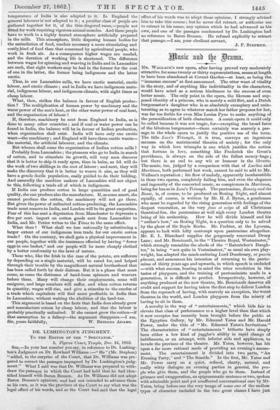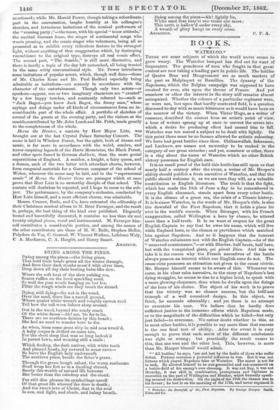Busk ROI it Alma.
MR. Wer.J.AcE's new opera, after having proved very moderately attractive for some twenty or thirty representations, seems at length to have been abandoned at Covent Garden—at least, as being the "immense success" at first announced. The utter want of vitality in the story, and of anything like individuality in the characters, would have acted as a serious hindrance to the success of even better music. The only point in the opera, the likeness and sup- posed identity of a princess, who is merely a mild flirt, and a Dutch burgomaster's daughter who is so absolutely exemplary and unin- teresting as to agree to whatever match her father proposes for her, was far too feeble for even Miss Louisa Pyne to make anything of the personification of both characters. A comic opera it could only be called because it was not tragic, for—excepting the broad farce of the bibulous burgomaster—there certainly was scarcely a pas- sage in the whole opera to justify the positive use of the term. The title Lore's Triumph, it is true, conveys an ingenious sarcasm on the matrimonial theories of- society ; for the only way in which love triumphs is one which justifies the notion that fortune in love, something like Frederick the Great's providence, is always on the side of the fullest money-bags ; but there is an end to any wit or humour in the libretto. The music, too, judged by a comparison with that of Lurline and A/twit:ma, both performed last week, cannot be said to add to Mr. Wallace's reputation ; his flow of melody, apparently inexhaustible in those two operas, completely failing him, and even the elegance and ingenuity of the concerted music, so conspicuous in Afaritano, being far less so in Love's Triumph. The pantomime, Beauty and the Beast, is, of course, to be produced on Boxing Night, and almost equally, of course, is written by Mr. H. J. Byron, a gentleman who must be regarded by the rising generation with feelings of the deepest veneration, as the very foss et °riga of all Christmas theatrical fun, the pantomime at well nigh every London theatre being of his authorship. How he will divide himself and his "author's bow," on Boxing Night, is a question only to be solved by the ghost of Sir Boyle Roche. Mr. Fechter, at the Lyceum, appears to look with lofty contempt upon pantomime altogether. Mr. E. L. Blanchard supplies the gorgeously renovated Drury Lane; and Mr. Boucicault, in the "Theatre Royal, Westminster," which strongly resembles the abode of the " Ratcatcher's Daugh- ter," in being "not quite in Vestminsteer," as usual ens own play- wright, has adapted the much-enduring Lord Dundreary, ut pueris placeat, and announces his intention of returning to the panto- mime of thirty years ago and upwards, in which speech is excluded —with what success, bearing in mind the utter revolution in the tastes of playgoers, and the training of pantomimists made in a generation, it is difficult to predict. Irrespectively, however, of anything produced at the new theatre, Mr. Boucicault deserves all credit and support for having taken the first step to deliver London from the reproach of having, with scarcely an exception, the worst theatres in the world, and London playgoers from the misery of having to sit in them.
A novelty in the way of "entertainments," which bids fair to elevate that class of performance to a higher level than that which it now occupies has recently been brought before the public at the Egyptian Gallery, by Mr. Edmund Yates and Mr. Harold Power, under the title of "Mr. Edmund Yates's Invitations." The characteristics of " entertainments " hitherto have simply been either a low kind of juggler's ability in rapid change of habiliments, or an attempt, with inferior aids and appliances, to invade the province of the theatre. Mr. Yates, however, has hit upon a far more rational mode of providing an evening's amuse- ment. The entertainment is divided into two parts, "An Evening Party," and "The Seaside." In the first, Mr. Yates and Mr. Power carry on a quiet, refined, chatty, natural, and really witty dialogue on evening parties in general, the peo- ple who give them, and the people who go to them. Instead of grimace and exaggeration, an epigrammatic sentence or two, spoken with admirable point and yet unaffected conversational case by Mr. Yates, bring before one the very image of some one of the endless types of character included in the two great classes I have just
mentioned; while Mr. Harold Power, though taking a subordinate part in the conversation, laughs heartily at his colleagues sketches, and introducer imitations of the musical performers of the "evening party ;"—thetenor, with his special" tenor attitude," the excited German basso, the singer of sentimental songs who wants pressing, and the comic singer who volunteers, being all so presented as to exhibit every ridiculous feature in the strongest light, without anything of that exaggeration which, by destroying resemblance to the original type, destroys all real comic effect. The second part, "The Seaside," is still more discursive, and there is hardly a topic of the day left untouched, all being treated in the same witty conversational style. Mr. Power introduces some imitations of popular actors, which, though well done—those of Mr. Charles Kean and Mr. Paul Bedford especially being admirable as imitations—are scarcely in accordance with the character of the entertainment. Though only two actors—or speakers—appear, one or two imaginary characters are "created" by a few happy touches, and constantly referred to—such as "Jack Bagot.—you know Jack Begot, the funny man," whose sayings and doings under all kinds of circumstances form no in- considerable part of the whole affair. A portfolio of sketches of several of the guests at the evening party, and the visitors at the seaside, contributed by Mr. John Leech and Mr. Frith, tends greatly to the completeness of the whole.
Herne the Hunter, a cantata by Heir Meyer Lutz, was brought out at the last Crystal Palace Saturday Concert. The scene is laid in Windsor Forest, but the spirit, both of drama and music, is far more in accordance with the weird, sombre, and terror-inspiring legends of the Hartz Mountains, the Black Forest, and other spots famed in German diabkrie, than the more genial superstitions of England. A maiden, a knight, a fairy queen, and a demon, each of the two latter with attendant chorus, however, form congenial materials for a German composer of the school of Weber, wherever the scene may be laid, and in the "supernatural music" of Hone the Hunter there are passages which at once prove that Herr Lutz is no unworthy disciple of that school. The cantata will doubtless be repeated, and I hope to recur to the snb- ject. The performance, by the company's orchestra, conducted by Herr Lutz himself, and a most efficient chorus, was admirable. Messrs. Cramer, Beale, and Co. have entrusted the editorship of their Christmas musical album to M. Rene Favarger, and the result is, perhaps, the best thing of the kind ever published. Elegantly bound and beautifully decorated, it contains no less than six and twenty original pieces, vocal and instrumental H. Favarger him- self contributes a considerable portion, and among the names of the other contributors are those of H. W. Balk, Stephen Heller, Polydore de Vos, C. Gentled, W. Vincent Wallace, Lefebure Wely, C A. Macfarren, C. A. Hargitt, and Henry Smart.
Astarntra.































 Previous page
Previous page